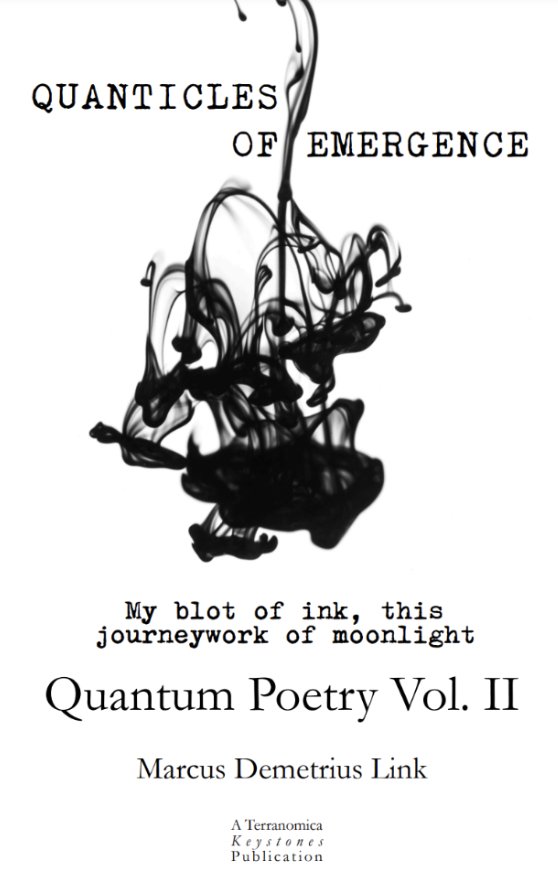
Quanticles of Emergence: Quantum Poetry Vol. II is available from Keystone Publications (signed paperback) and Amazon (paperback)
The seven poems of Quanticles of Emergence: Quantum Poetry Vol. II take us on a transformative pilgrimage which moves from fragmentation to wholeness through interbeing with the world.
My blot of ink, this journeywork of moonlight
The subtitle, “My blot of ink, this journeywork of moonlight,” is the metaphor that encapsulates the journey: poetry as an alchemical process that bridges inner and outer worlds and which transforms the inkblot of experience into the moonlit clarity of emergence.
The mood of alienation conjured in Poems from the Global Village: Quantum Poetry Vol. I becomes a process of emergence, where I, as the poetic subject, begin to re-weave myself into the larger web of life.
The aesthetic moves toward a kind of poetry that reflects the patterns of life itself. The language becomes more fluid, organic, and attuned to nature’s processes, embodying principles of life and death, of interdependence and renewal.
Volume II contains seven poems:
- Moulting
- The Little Man Dancing in My Heart
- Bits and Pieces of the Soul
- Promise of a Man
- Descending into Myself
- I Am Your Vessel, Not Your Captain
- Out of the World, Into its Middle
The Poetics of Regeneration: On Transformation and Shedding the Old Self
Moulting builds on the profound image of shedding the old self, a process akin to ecological succession where destruction gives way to renewal:
“It is time to die. And yet, we knew them,
we knew them like our own skin,
and they were our skin, the skin we knew
from the inside…”
These lines from Moulting encapsulate the transformative process of emergence, where identity must be surrendered for renewal, much like natural cycles of decay and regeneration. The shedding of old skin mirrors the ecological process of regeneration, a necessary death for new life. Ecosophically, it aligns with nature’s wisdom of cycles—decay and renewal. From an integral lens, this reflects a transition from egoic constraints to deeper, embodied awareness.
Reconciliation with Nature’s Gravity
“is it not clear that
only he who is light at heart
has no need to lament his relations with gravity
for they will not keep him from
returning into the peaceful cradle
of mother nature’s womb, to dissolve
into the weightless middle of the world?”
This passage from the poem Out of the World, Into its Middle speaks to the relational harmony between self and nature, a core principle of ecosophical aesthetics. It integrates surrender with ecological belonging, and it also resonates with call for nondual realization in Ken Wilber’s integral perspective.
“Becoming” as in “growing into something” beyond mere “being something or someone” is a relational process of surrender to natural forces, and embedded in these lines is a Gaian sensibility where the poet surrenders the weight of ego to embrace the Earth’s rhythms.
From an ecosophical perspective, it’s a return to the Earth as a source of both physical and spiritual gravity. The poem captures the relational quality of ecosophical aesthetics: the understanding that the self is not separate but part of the living matrix of nature and cosmos. Here, Steiner’s etheric rhythms are palpable: the soul synchronizes with natural cycles, much like the Earth regenerates through its seasons.
In Wilber’s terms, this reflects the integration of self and cosmos, transcending alienation, and thus the poem opens with the lines:
“the world does not stop its turning
for the miserable and bitter”,;
a reflection of the non-anthropocentric flow of life—human turmoil exists, yet the greater rhythms of nature endure, a reminder of our smallness and relevance within the ecological whole.
Inner Pilgrimage as Ecological Awakening
Descending Into Myself charts the inner work of reconnecting with the deeper self:
“to feel my way forward, stumbling,
seeking to fathom the depth of this ground,
that is alive, though no longer only mine,
and I, no longer only me.”
Here, the “ground” is both literal and symbolic. It reflects a deep ecological awareness: the self is no longer isolated but entangled with life itself. This line aligns with Steiner’s etheric worldview and Jungian individuation—where one’s roots grow into the wider web of being.
On Generational and Cosmic Continuity
“The universe sent out its stream of grace
to travel through my riverbed of time
towards another tomorrow…
where I will have been your boat
and of which I will not be a part.”
These lines from I Am Your Vessel, Not Your Captain convey the flow and continuity across generations. It reflects the Gaian understanding of humans as vessels within the interconnected web of existence, contributing to life’s ongoing story.
Available from:
